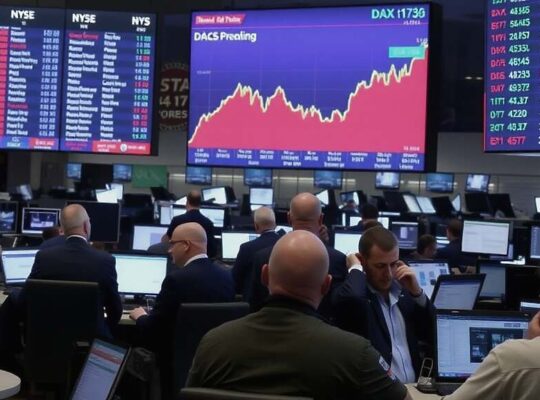German equities demonstrated muted movement on Monday, with the DAX index hovering around 24,210 points – a marginal decline of 0.1% from Friday’s close. While Infineon, Commerzbank and Siemens led the gains, Symrise, Beiersdorf and Brenntag trailed behind, reflecting a general lack of decisive market direction. The performance underscores ongoing anxieties surrounding the resilience of the German economy amidst significant global headwinds.
A surprisingly positive Ifo business climate index release offered a brief respite from the prevailing cautious sentiment. Thomas Gitzel, Chief Economist at VP Bank Group, acknowledged the index’s modest improvement, noting a visible, albeit gradual, enhancement across both the service and manufacturing sectors. Notably, the manufacturing sub-index reached a two-and-a-half-year high, contradicting the often-bleak portrayal of the German industrial landscape found in mainstream media.
Gitzel attributed the strengthened outlook, at least in part, to expectations of increased government spending and a perceived willingness by policymakers to advocate for corporate interests. However, he cautioned against interpreting the uptick as a sign of robust recovery. “This improvement must not obscure the fact that many businesses continue to face considerable challenges” he stated, characterizing the upward trend as “fragile.
The fragile nature of the improvement highlights a precarious situation. While government intervention offers some immediate relief, the underlying structural issues plaguing the German economy remain unresolved. The persistent threat of trade conflicts and the ongoing, disruptive transformation within the automotive industry – a cornerstone of German industrial output – continue to exert downward pressure. These factors, coupled with the broader concerns about global economic slowdown, suggest the DAX’s stability and the optimistic Ifo index reading may prove to be temporary.
Fluctuations in the Euro also added a layer of complexity. The currency saw a slight appreciation, trading at $1.1643, a factor which could potentially impact export-oriented businesses. Simultaneously, a decline in oil prices, with Brent crude falling to $65.54, offered a marginal benefit for energy-dependent industries but also signaled continued anxieties concerning global demand.












